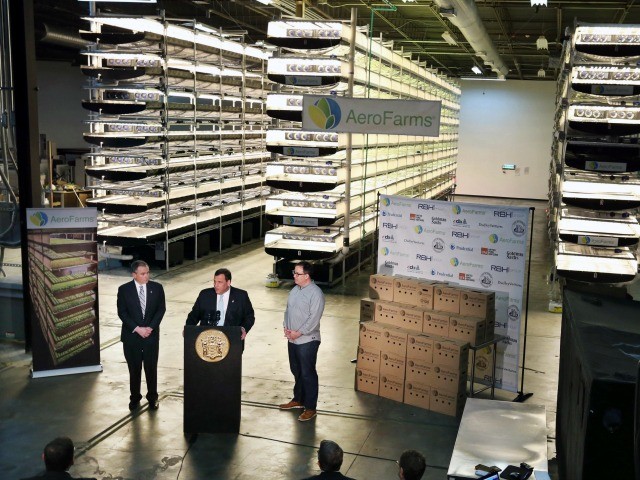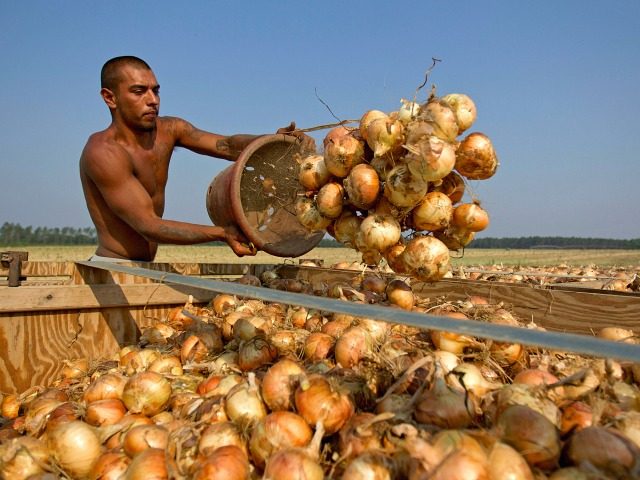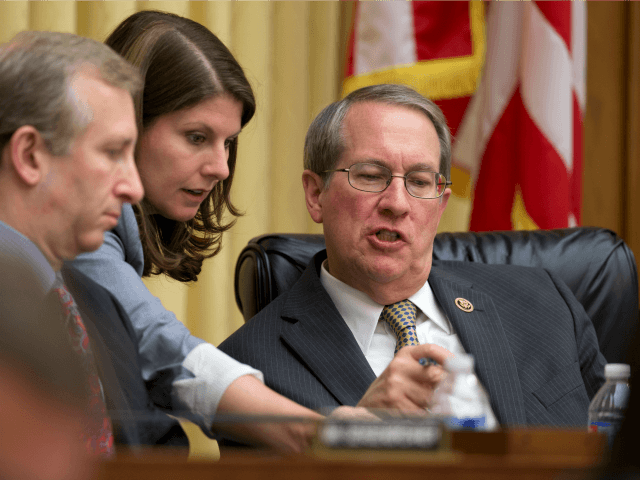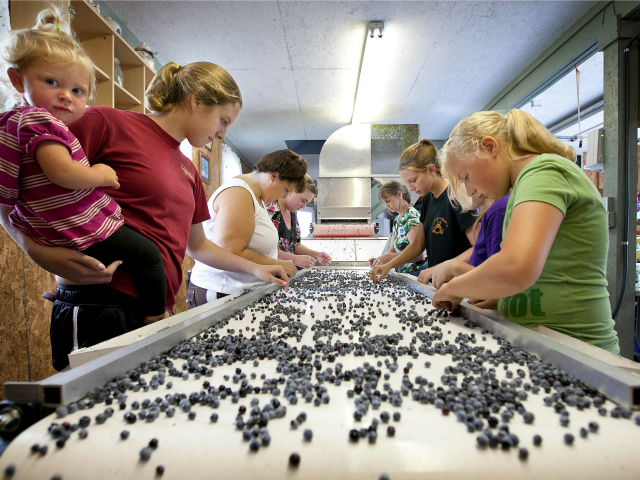House Republicans are expected to approve a gigantic “H-2C” guest-worker bill on Wednesday that allows the nation’s food industry to employ one million low-wage, foreign guest-workers — regardless of how many Americans would lose their skilled or unskilled jobs in fields, orchards, cattle ranches, dairy farms, forests, seafood ports, meat-packing plants, and food processing factories.
The huge wave of outsourcing “guest workers” would displace and cut wages for a huge number of blue-collar Americans, and also would slash incentives for agriculture companies to develop and manufacture European-style high-tech labor-saving gear, such as robotic cow-milkers, fruit pickers, and meat cutters.
The H-2C bill is authored by Rep. Robert Goodlatte, the chairman of the House Judiciary Committee, whose members will vote Wednesday for the bill. His Virginia district includes several turkey and chicken processing plants which employ many low-wage migrants and new refugees.
The H-2C guest-workers would be cheaper than Americans because they would be paid a little above minimum wage. Also, they would not get housing or transport costs, the Earned Income Tax Credit, or even a guarantee of full-time work, according to the bill.
The guest-worker bill may also deliver cheap replacement workers to urban restaurants because it includes employees who process food “for further distribution.” That term is broad enough to include urban workers who prepare and package bulk food for use in restaurant chains which serve fast food or sandwiches.
The proposed H-2C program is a logical expansion of the federal government’s longstanding business-first, cheap-labor national economic strategy. The cheap-labor policies allow millions of foreign workers to cross the borderline into the union of the 50 states to drive down costs and to boost stock values. The migrants include roughly 8 million employed illegal immigrants, millions of “EAD” workers, unemployed refugees, plus the H-1B, H-2A, H-2B, L, J-1 and other guest-worker programs, plus the annual inflow of 1 million legal immigrants who serve as both workers and consumers.
The total annual inflow of foreign workers is at least 3 million, helping to lower wages for the 4 million young Americans who join the labor force each year. This bipartisan economic policy was rejected in the 2016 election when Americans picked an outsider — President Donald Trump — to help reform the nation’s cheap-labor rules.
The H-2C program would also complete a century-long trend in the meat-packing industry, where the left-wing media — such as author Upton Sinclair — helped create many urban, high-paying, unionized meatpacking jobs. Since the 1970s, and amid the ideological shift of the media from economic priorities to progressive social-issue priorities, the meatpacking industry has rapidly converted the well-paid urban meatpacking jobs into low-wage, temporary, rural jobs for many illegals, refugees, and guest-workers.
However, a majority of workers in the meat-processing, and roughly half of farm workers — were still native-born Americans, according to a 2009 report. All farm workers would be Americans or legal immigrants if the employment laws were enforced — but industry pressure on politicians has blocked enforcement for decades.
Democrats are likely to oppose the H-2C bill because it mistreats employees — but also because it provides only 10,000 green cards per year to the agriculture workers, said Mark Krikorian, the director of the Center for Immigration Studies. If the H-2C farm-worker bill is combined with an amnesty and include more green cards, Democrats may fully support the exploitation bill, he predicted.
The H-2C bill would likely get some support in the Senate, where business-first GOP Sen. Ron Johnson has drafted a bill that would provide annually work-permits to 500,000 more foreign workers, plus their families.
Goodlatte said in an October 2 statement:
For far too long, the broken H-2A guestworker program has buried American farmers in red tape and excessive costs without delivering access to a stable and reliable workforce. It’s clear that the current program is outdated and broken for American farmers, and it’s well past the time to replace it with a reliable, efficient, and fair program that provides American farmers access to a legal, stable supply of workers, both in the short- and long-term, for seasonal as well as year-round work.
The bill is designed to provide the food industry with many cheap workers — while also preventing those imported workers from becoming U.S. citizens, or from having children born in the United States. That worker-to-citizen process has proved deadly for the Republican Party in Democratic-run California but also in Goodlatte’s home state of Virginia, where a large number of immigrants has turned the one GOP state into a Democratic-leaning state.
The GOP effort to deny citizenship to government-dependent foreign workers is anathema to the Democratic Party, which has gained millions of voters — plus political control of California — as millions of former illegal-immigrant farm workers have gradually gotten citizenship for themselves or their U.S.-born children. “I don’t see the Democrats being able to support that bill … [because it ensures] quasi-serfdom,” said Mark Krikorian, director of the Center for Immigration Studies. He continued:
For both cynical and good reasons, they don’t want the [guest workers] to be indentured serfs to a tied to a job — which they really are — and at the same time, they want to make them citizens so they vote for Democrats
The massive importation of wage-cutting workers is anathema to pro-American immigration reformers, such as Krikorian. They are trying to cut the supply of foreign workers so that Americans wages can finally rise above their 1973 levels.
To win the support of pro-American reformers and voters, Goodlatte’s bill is being packaged with a popular bill that would require companies to verify that new hires can legally work in the United States. That is a top priority for immigration reforms groups because it would reduce the iring of illegal immigrants and force up wages for Americans. The “E-verify” bill was developed by Texas Rep. Lamar Smith, and it titled the Legal Workforce Act.
“Nearly 20 million Americans are unemployed or underemployed,” Smith said in a statement. “Meanwhile, seven million people are working in the United States illegally. By expanding the E-Verify system to all U.S. employers, this bill will ensure that jobs only go to legal workers.” Smith is also pushing for passage of a bill that would raise Americans’ wages by reducing the labor supply of unskilled immigrant workers.
Goodlatte’s bill was developed in cooperation with the agriculture industry, which is now complaining that a labor shortage – despite the employment of roughly 500,000 illegals — is forcing it to raise wages for Americans, to change agricultural techniques and to buy labor-saving machinery. The agriculture industry now employs roughly 1 million farm workers, half of whom are American. According to the Los Angeles Times:
Not surprisingly, wages for crop production have climbed 13% from 2010 to 2015 — a higher rate than the state average, according to a Los Angeles Times analysis of Labor Department data.
The tight labor market in agriculture is forcing up wages — and is cutting profits for investors. The S&P GSCI Agriculture Index shows that the stock value of major U.S. agriculture companies has dropped by roughly 40 percent since 2012.
The bill would allow agriculture companies to import 500,000 new workers each year, under the supervision of the business-first Department of Agriculture, and it would grow the cap 10 percent whenever the food industry runs out of H-2C workers.
Skilled H-2C workers can stay for three years, and unskilled H-2C workers could stay for 18 months. Both categories could return to work after a 45-day visit home. Those long residency periods would provide the industry with a resident population of roughly 1 million foreign workers.
Those long residency periods would provide the industry with a resident population of roughly 1 million foreign workers. Initially, the roughly 500,000 illegal immigrants now employed by the industry could be hired while also being exempted from the 500,000 cap. Also, workers hired under the H-2A guest-worker programs — at least 160,000 in 2017 — would also be given H02C permits but would be exempt from the 500,000 cap.
If the H-2C workers walk off the job to find illegal but better-paid employment in towns and cities, the farm companies can import replacement H-2BC workers. The legislation says:
‘(2) REPLACEMENT OF ALIENS.—An employer may designate eligible aliens to replace H–2C workers who abandon employment notwithstanding the numerical limitation found in section 214(g)(1)(C).
The bill includes minimal protections for American and H-2C workers. For example, farm companies are supposed to advertise jobs so that American workers can apply — but few Americans will apply once the wages drop to levels set by the federal government.
Also, agriculture companies can keep their imported H-2C workers idle and unpaid for up to 50 percent of the time they are in the United States. Those workers can complain but must hire their own lawyers and comply with the judgment of an arbitration process. When farm companies cheat H-2C workers of wages, the federal government can enforce proper payments, but the bill does not describe any punishments for companies that try to cheat their imported workers.
Federal inspectors would not be allowed to make surprise visits to the worksites where H-2C workers are employed, the bill says.
‘COMPLIANCE WITH BIO-SECURITY PROTOCOLS.—Except in the case of an imminent threat to health or safety, any personnel from a Federal agency or Federal grantee seeking to determine the compliance of an employer with the requirements of this section or section 218B shall, when visiting such employer’s place of employment, make their presence known to the employer and sign-in in accordance with reasonable bio-security protocols before proceeding to any other area of the place of employment.
The legislation also offers green cards to 10,000 H-2C guest workers per year, under existing “extraordinary ability” immigration laws, which provide residency to persons who have:
extraordinary ability in the sciences, arts, education, business, or athletics which has been demonstrated by sustained national or international acclaim or, with regard to motion picture and television productions a demonstrated record of extraordinary achievement, and whose achievements have been recognized in the field through extensive documentation, and seeks to enter the United States to continue work in the area of extraordinary ability.
In the H-2C bill becomes law, the resulting flood of cheap and exploitable workers would drop labor prices to minimum-wage levels and would end the growing pressure for automation on farms in California, Wisconsin, Washington State, Maine, Vermont and Oregon and other states. This cheap-labor would leave U.S. farmers falling further behind their rivals in Europe and South America, where companies are using modern management techniques to beat American competitors.
For example, this 2012 video shows cheap-labor being used to harvest onions in Vidalia, Georgia.
This video shows a U.K. farmer using three different machines to harvest onions without imported labor:
U.S. farms are also falling behind in the use of robots. In Chile, for example, one farming company has bought 64 European-designed cow-milking robots for 4,500 cows. In contrast, the biggest U.S. buyer of farm-robots is a farm in Michigan which has bought only 24 cow-milking robots.
Similarly, Asian agricultural companies are building automated urban, non-polluting glasshouse-farms, close to their workforces and their customers. Some U.S. companies are building similar “vertical farms” in urban factory buildings, so helping raise wages for urban workers.

New Jersey Gov. Chris Christie answers a question during a gathering at AeroFarms, a vertical farming operation, Thursday, March 24, 2016, in Newark, N.J.
The agriculture industry is backing the H-2C gueset-worker bill — but want it to be even larger. An October 2 statement from the American Farm Bureau Federation said:
Every year, farmers and ranchers face greater challenges in finding enough workers to keep their businesses running. The labor shortage on America’s farms and ranches is growing, and the lack of a stable, legal supply of workers places the health of too many farms at risk. We cannot afford to see any more of our nation’s food supply lost in the fields.
“The Ag Act’s proposed guest worker visa program would bring much needed improvements to the current system while addressing the needs of our current workforce and providing a streamlined visa process for skilled, agricultural workers in the future. Although Farm Bureau members have concerns on certain points, such as capping the number of visas, we stand ready to work with Chairman Goodlatte and members of Congress to refine these provisions for the good of all U.S. agriculture.
A statement from the National Pork Producers Council said in a statement:
“The U.S. pork industry is suffering from a serious labor shortage,” said NPPC President Ken Maschhoff, a pork producer from Carlyle, Ill. “We commend Congressman Goodlatte for sponsoring this important legislation, which allows undocumented workers already in the United States to continue working in vital agriculture jobs.”
“The U.S. pork industry needs a viable agriculture workforce to remain globally competitive,” Maschhoff said. “The current visa programs are not working for pork producers or for the broader agriculture community. The Goodlatte bill will rectify this.”
Four million Americans turn 18 each year and begin looking for good jobs in the free market.
But business groups have used their political power to tilt the labor market in their favor, via the federal policy of importing 1 million consumers and workers each year. The government also hands out almost 3 million short-term work permits to foreign workers. These permits include roughly 330,000 one-year OPT permits for foreign graduates of U.S. colleges, roughly 200,000 three-year H-1B visas for foreign white-collar professionals, and 400,000 two-year permits to DACA illegals. Universities employ roughly 100,000 foreign guest workers.
That Washington-imposed economic policy of mass-immigration floods the market with foreign labor, spikes profits and Wall Street values by cutting salaries for manual and skilled labor offered by blue-collar and white-collar employees. It also drives up real estate prices, widens wealth-gaps, reduces high-tech investment, increases state and local tax burdens, hurts kids’ schools and college education, pushes Americans away from high-tech careers, and sidelines at least 5 million marginalized Americans and their families, including many who are now struggling with opioid addictions.
The cheap-labor policy has also reduced investment and job creation in many interior states because the coastal cities have a surplus of imported labor. For example, almost 27 percent of zip codes in Missouri had fewer jobs or businesses in 2015 than in 2000, according to a new report by the Economic Innovation Group. In Kansas, almost 29 percent of zip codes had fewer jobs and businesses in 2015 compared to 2000, which was a two-decade period of massive cheap-labor immigration.
Americans tell pollsters that they strongly oppose amnesties and cheap-labor immigration, even as most Americans also want to favor legal immigrants, and many sympathize with illegals.
Because of the successful cheap-labor strategy, wages for men have remained flat since 1973, and a growing percentage of the nation’s annual income is shifting to investors and away from employees. The business-funded Hamilton Project suggests that the shift is transferring $1 trillion per year from 160 million employees to the nation’s investors.



COMMENTS
Please let us know if you're having issues with commenting.